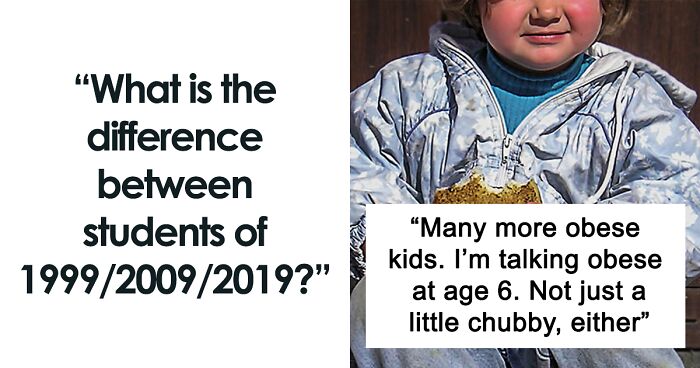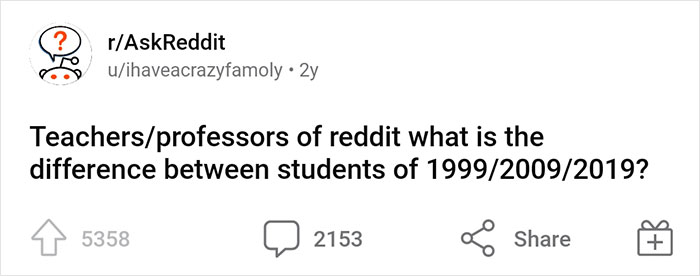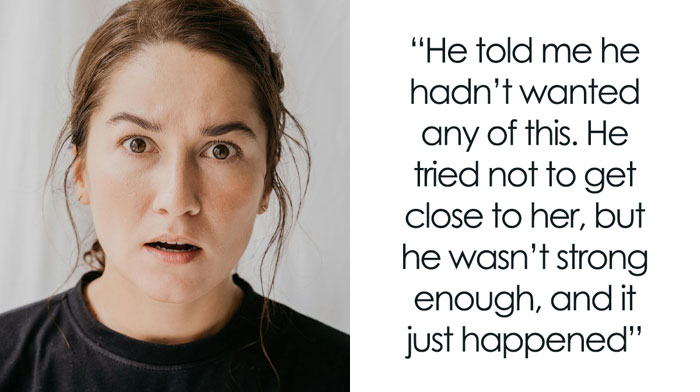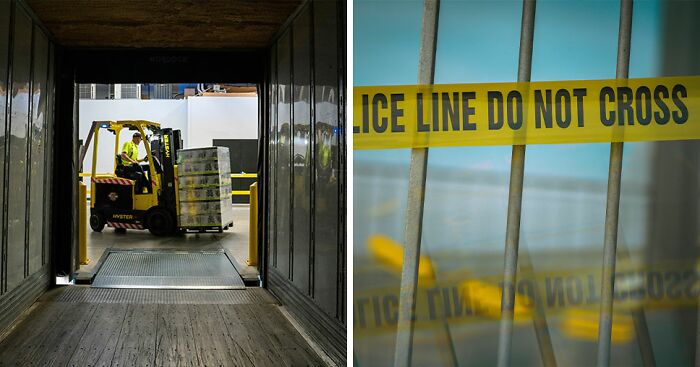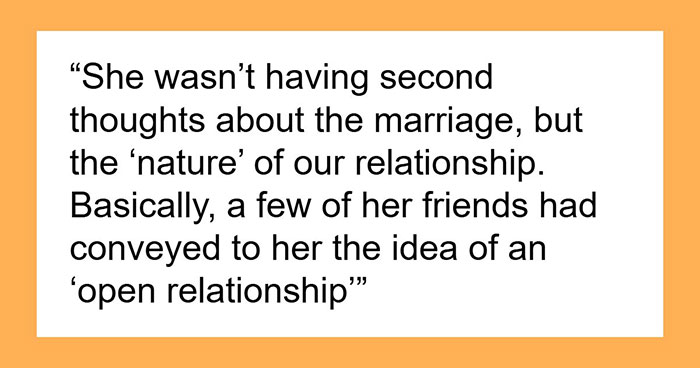We do suspect that kids are different these days than when we were in school. There are many reasons for it: from generational differences to technological advancement, the children of today and those of two decades ago are not just years but rather light-years apart.
But there are people who experience this change first-hand. They are teachers, educators, and professors who have devoted their lives to raising little daredevils into rebellious (or not) teens, helping them to discover their identities, strengths, and weaknesses. They are the ones who have spent the most time with the youngsters, and they surely have collected a lot of observations on their way.
“Teachers/professors of Reddit, what is the difference between students of 1999/2009/2019?,” someone wondered on Ask Reddit, sparking an illuminating thread with incredible insights. Below, we wrapped up the most interesting responses, so scroll down!
This post may include affiliate links.
 I've taught (still teaching) elementary (mainly 1st - 3rd) since the mid 90s. Differences:
1- Many more obese kids. I'm talking obese at age 6. Not just a little chubby, either.
2- Many more attention problems. Not just the severe ones (ADD/ADHD), but kiddos who just have trouble focusing. Now, I don't want to hear a lot of backlash from non-teachers who say we mean teachers expect kids to sit all day and work. My students change activities frequently. They are allowed to stand instead of sit. We also do quite a bit of hands on stuff. But over the years, I've noticed a HUGE problem with focusing and getting things done.
3- Kids don't read as much. They spend free time on electronic devices. It's addictive and I'm guilty, too. I LOVE to read, but I find myself here on Reddit or elsewhere on the internet instead of actually READING books. But I'm 49. These kids NEED to read. And they need to read BOOKS.
4- Their vocabulary and speaking skills are lacking. Why? Well, the speech/language teacher at my school gave her theory. She worked in the private sector over the summer. Parents would drop off their young kids to her and sit in the lobby on their phones (as we all do). Over the summer she would assess these kiddos and most all of them were of normal intelligence and ability. So why are the kiddos severely behind in speaking and language skills? She claims that parents are not SPEAKING enough to their children. We adults spend so much time on our phones and laptops and are not having enough conversations with our children. I have to agree with this. Fifteen/20+ years ago, we were all not glued to our phones. People CONVERSED more with their kids in the past.
I've taught (still teaching) elementary (mainly 1st - 3rd) since the mid 90s. Differences:
1- Many more obese kids. I'm talking obese at age 6. Not just a little chubby, either.
2- Many more attention problems. Not just the severe ones (ADD/ADHD), but kiddos who just have trouble focusing. Now, I don't want to hear a lot of backlash from non-teachers who say we mean teachers expect kids to sit all day and work. My students change activities frequently. They are allowed to stand instead of sit. We also do quite a bit of hands on stuff. But over the years, I've noticed a HUGE problem with focusing and getting things done.
3- Kids don't read as much. They spend free time on electronic devices. It's addictive and I'm guilty, too. I LOVE to read, but I find myself here on Reddit or elsewhere on the internet instead of actually READING books. But I'm 49. These kids NEED to read. And they need to read BOOKS.
4- Their vocabulary and speaking skills are lacking. Why? Well, the speech/language teacher at my school gave her theory. She worked in the private sector over the summer. Parents would drop off their young kids to her and sit in the lobby on their phones (as we all do). Over the summer she would assess these kiddos and most all of them were of normal intelligence and ability. So why are the kiddos severely behind in speaking and language skills? She claims that parents are not SPEAKING enough to their children. We adults spend so much time on our phones and laptops and are not having enough conversations with our children. I have to agree with this. Fifteen/20+ years ago, we were all not glued to our phones. People CONVERSED more with their kids in the past.
💯. Im a peds nurse since 2010 and kids are overweight and overstimulated with electronics. So many parents throw the ipad at kids when they out a dinner and no one talks to each other. I always sadly laugh when I see 1-2 year olds with ipads at dinner. Wth people. My kids are smart, read, good social skills and dont need constant technology. Kids need to learn how to deal with being bored once in a while. This plays into the instant gratification and entitlement.
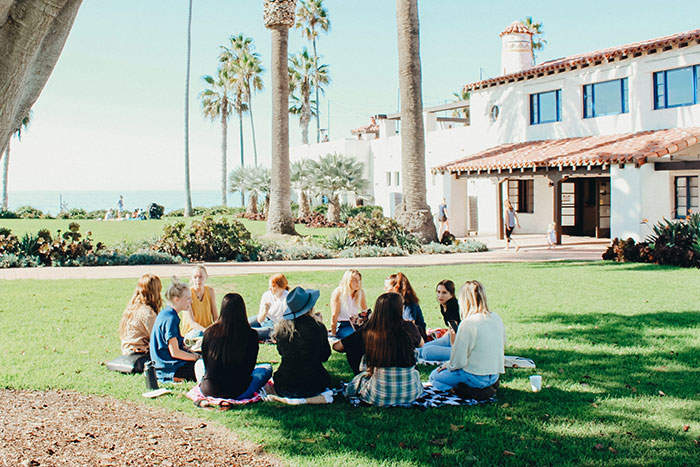 I've been teaching high school since 1993.
Students are less homophobic by a long shot, at least where I've been. There is still homophobia but they can't be open about it.
Students talk about things like depression and mental illness more; whether the prevalence rate for things like depression actually is higher or not I don't know, but it's more talked about.
Attitudes toward school are about the same. Hard workers, average workers, and slackers are still probably the same proportion.
Obviously the use of technology is dramatically increased, which is good and bad. It's definitely made research super easy.
There's more awareness of bullying, though sometimes this term gets thrown around too casually.
Students in special ed are no longer openly mocked.
Students are larger. A lot larger.
Dating in an official sense doesn't seem to occur anymore; just seems like FWB (or without benefits) is the typical arrangement.
Seems like students spend a lot more time inside than 20 years ago.
I've been teaching high school since 1993.
Students are less homophobic by a long shot, at least where I've been. There is still homophobia but they can't be open about it.
Students talk about things like depression and mental illness more; whether the prevalence rate for things like depression actually is higher or not I don't know, but it's more talked about.
Attitudes toward school are about the same. Hard workers, average workers, and slackers are still probably the same proportion.
Obviously the use of technology is dramatically increased, which is good and bad. It's definitely made research super easy.
There's more awareness of bullying, though sometimes this term gets thrown around too casually.
Students in special ed are no longer openly mocked.
Students are larger. A lot larger.
Dating in an official sense doesn't seem to occur anymore; just seems like FWB (or without benefits) is the typical arrangement.
Seems like students spend a lot more time inside than 20 years ago.
 In regards to technology, I think “experts” who have been telling us that the students are going to come in very technologically literate don’t actually realize WHAT technology students are using. Students are using cell phones, occasionally tablets, and gaming devices like xBox. They don’t use computers actively at home.
Massachusetts switched their standardized testing to computer based testing. 100% of our students have no idea how to type in a computer when they come to us in elementary school. So not only do we have to teach them the content for these ridiculous tests, we have to teach them how to type fluently and accurately before third grade so they can type essays on the computer at 8 years old. They said the switch was because students are more technologically savvy then ever before, which is probably partially true, but not in the way that they want.
In regards to technology, I think “experts” who have been telling us that the students are going to come in very technologically literate don’t actually realize WHAT technology students are using. Students are using cell phones, occasionally tablets, and gaming devices like xBox. They don’t use computers actively at home.
Massachusetts switched their standardized testing to computer based testing. 100% of our students have no idea how to type in a computer when they come to us in elementary school. So not only do we have to teach them the content for these ridiculous tests, we have to teach them how to type fluently and accurately before third grade so they can type essays on the computer at 8 years old. They said the switch was because students are more technologically savvy then ever before, which is probably partially true, but not in the way that they want.
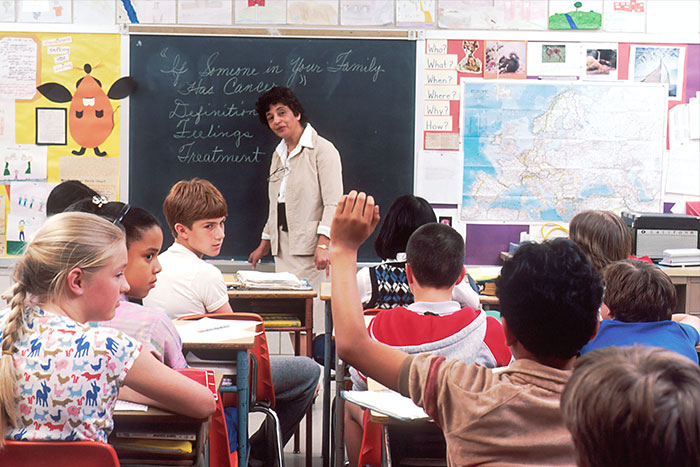 Today's students don't know how to struggle or persevere through a problem. If they can't do it immediately, they need help.
On the plus side, they know a lot more about each other and are open to diversity. They communicate their emotions.
Today's students don't know how to struggle or persevere through a problem. If they can't do it immediately, they need help.
On the plus side, they know a lot more about each other and are open to diversity. They communicate their emotions.
I still have no idea what to do with the part of my brain that used to store the enormous amount of phone numbers of my family and friends. Yes, I'm one of those: "Hey Grandpa!, more like Grand-Grandpa now, but seriously, I often think about that when I call someone on my phone and look at the number: "Huh..there was a time I could just dial this number without even thinking what the number was, now I just push a button, it's a good thing and yet, kinda sad at the same time.
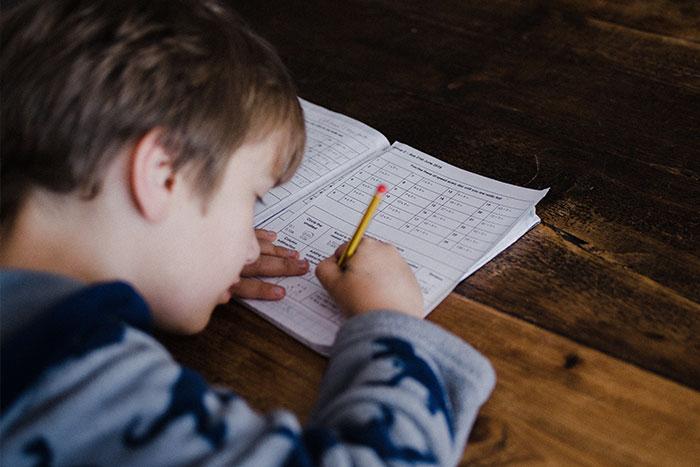 My friend who's a first grade teacher says that kids are more anxious, less able to self soothe, and unprepared to solve even basic (first grader level) problems themselves.
My friend who's a first grade teacher says that kids are more anxious, less able to self soothe, and unprepared to solve even basic (first grader level) problems themselves.
Poor kids had to do kindergarten online in an educational environment completely unprepared for digital learning. They lived in fear and the world became dangerous. Contact with other human beings which before sustained us and made us a community became a source of fear. It's not a wonder that they're struggling. We all are too.
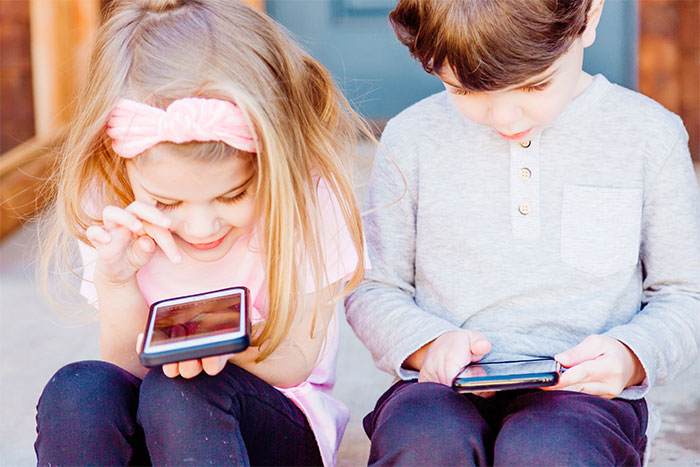 In 1999, class was super noisy when you came in. Everyone talking and then quieting down when you started teaching. Now, like walking into a funeral home. cell phone silence.
In 1999, class was super noisy when you came in. Everyone talking and then quieting down when you started teaching. Now, like walking into a funeral home. cell phone silence.
This is only in those schools where cell phones are allowed in class. Our class is still super noisy.
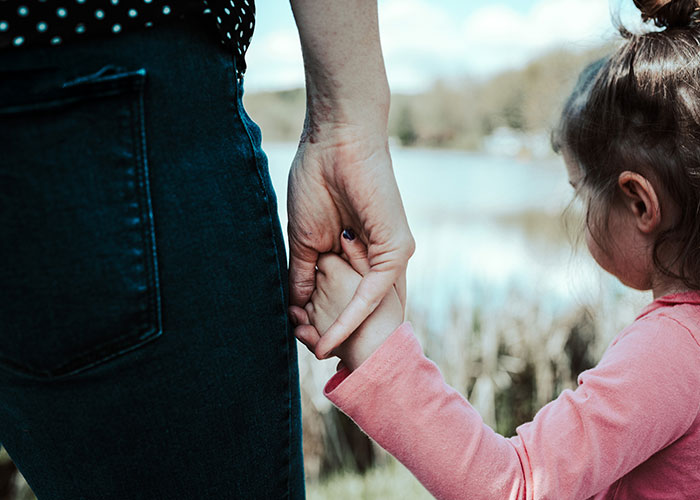 My students today are way over protected and far more nervous than when I started teaching in 1994. For example I have had several students ( typically girls) who at 12 or 13 have literally never been alone. Then have not been on a bike ride alone or a walk around their block alone. Their parents are so afraid of stranger danger that they are preventing their students from having the necessary alone time to get into trouble and try to solve problems independently. The students are far more prone to anxiety, depression, cutting and suicidal idealization than previous generations of students. Probably related, but who knows.
Students are afraid of risk and need teacher support and because it is available all the time they kind of expect it. I had a student email me an hour ago because he did not understand a question on his homework. And I responded with some additional info to support this student. On a Sunday morning. Of course I am the one who taught them how to actually email something and I answered the email, so perhaps I am a contributor to this issue. 20 years ago he would have had to figure it out and give his best guess and let the chips fall.
My students today are way over protected and far more nervous than when I started teaching in 1994. For example I have had several students ( typically girls) who at 12 or 13 have literally never been alone. Then have not been on a bike ride alone or a walk around their block alone. Their parents are so afraid of stranger danger that they are preventing their students from having the necessary alone time to get into trouble and try to solve problems independently. The students are far more prone to anxiety, depression, cutting and suicidal idealization than previous generations of students. Probably related, but who knows.
Students are afraid of risk and need teacher support and because it is available all the time they kind of expect it. I had a student email me an hour ago because he did not understand a question on his homework. And I responded with some additional info to support this student. On a Sunday morning. Of course I am the one who taught them how to actually email something and I answered the email, so perhaps I am a contributor to this issue. 20 years ago he would have had to figure it out and give his best guess and let the chips fall.
I'm not surprised about your mention of young girls never going for bike rides alone. There IS danger of SA or kidnapping, it's not a fear, it's a reality.
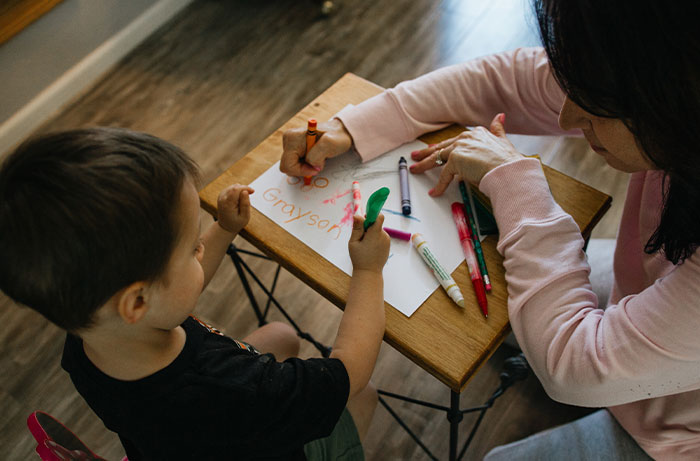 There’s some sense of entitlement I’ve noticed. Like “I deserve a better grade” or “I deserve an extension because this week has been hard”. Plus some sense of arrogance: “why should I follow your instructions? My way is better”. To be fair, sometimes their way is better and I have learned from them in some occasions.
There’s some sense of entitlement I’ve noticed. Like “I deserve a better grade” or “I deserve an extension because this week has been hard”. Plus some sense of arrogance: “why should I follow your instructions? My way is better”. To be fair, sometimes their way is better and I have learned from them in some occasions.
That's usually picked up from the parents at home. They listen to mom or dad rant about how they deserve more pay for doing multiple people's jobs. Then also seeing how mom and dad's decisions usually back fire so why the f**k listen to any adult they're all the same right?
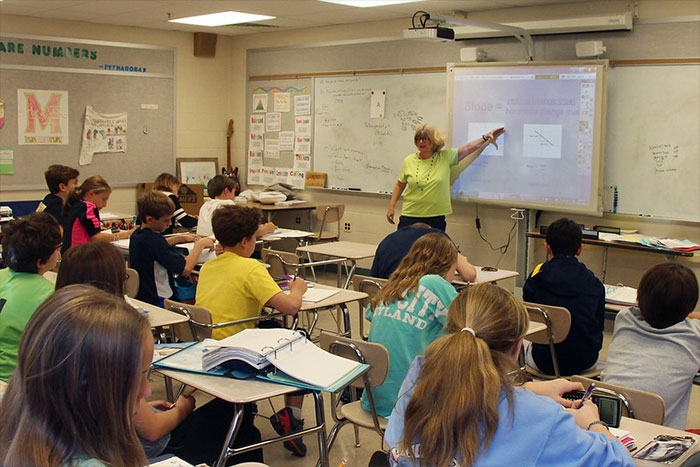 Less ownership of learning/sense of curiosity, less grit/resilience, and large sense of entitlement. I teach middle school in the somewhat rural area where I grew up, and I still love my job and "my kids", but damn, it is so much more difficult these days.
Less ownership of learning/sense of curiosity, less grit/resilience, and large sense of entitlement. I teach middle school in the somewhat rural area where I grew up, and I still love my job and "my kids", but damn, it is so much more difficult these days.
I wonder if there’s less curiosity because there’s easy access to knowledge via the internet. If I know I can Google the answer, it kind of removes a lot of the thought process of trying to piece it together in my head first. I can just look it up. I don’t have to figure it out myself to come up with a working hypothesis.
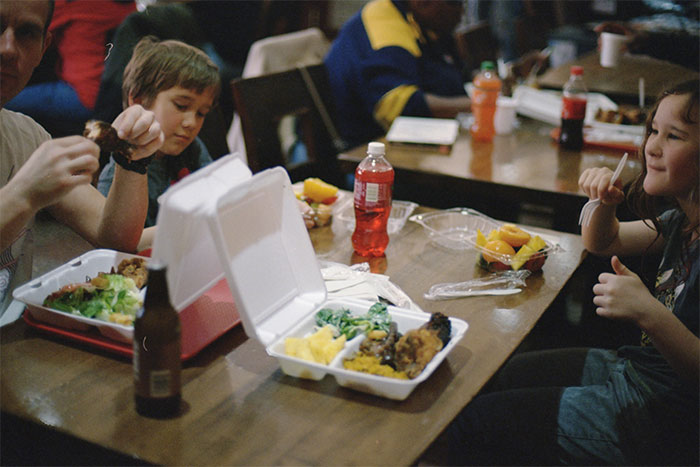 I’ve been a teacher for 15 years and one thing I’ve noticed is that in recent years the “breakfast club” stereotypes like jocks, nerds, etc. seem to be falling by the wayside and kids seem to be hidden under many layers of irony.
I’ve been a teacher for 15 years and one thing I’ve noticed is that in recent years the “breakfast club” stereotypes like jocks, nerds, etc. seem to be falling by the wayside and kids seem to be hidden under many layers of irony.
Actually i found that the people participating in after school stuff and the gamers still seem to gather in the same spot its pretty easy to pick out the theater kids and cheerleaders
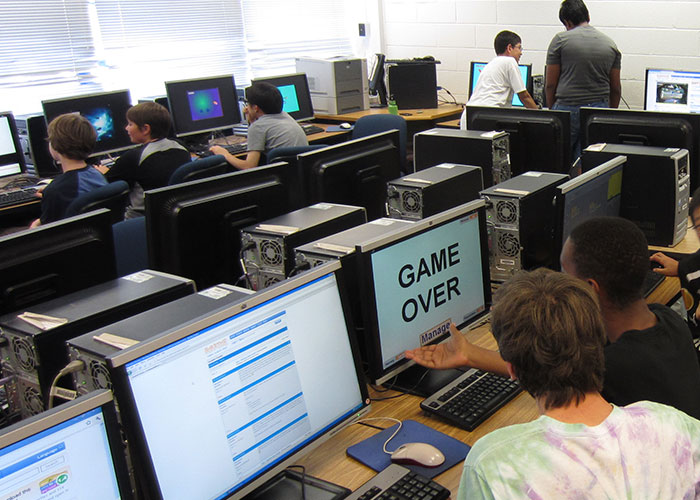 Been teaching since 2006. Kids are getting worse with computers due to them mostly using smart devices. I'm spending more time teaching things like how to double click and enter a URL than I used to.
Otherwise they seem the same though. It's the parents that are different--they're overextended and their kids are suffering since their parents don't have the spoons to engage in their education as much as they need to.
Been teaching since 2006. Kids are getting worse with computers due to them mostly using smart devices. I'm spending more time teaching things like how to double click and enter a URL than I used to.
Otherwise they seem the same though. It's the parents that are different--they're overextended and their kids are suffering since their parents don't have the spoons to engage in their education as much as they need to.
 Mainly, I have noticed kids are both more remarkable and emotionally/mentally weaker. I'll watch a group of ninth graders perform a flawless orchestra concert. Then, the next day they'll break down in a full on anxiety attack. I don't know what happened, but teenagers' coping skills have gone to hell in a hand basket. Maybe overprotective/helicopter parents are to blame? Who knows?
Mainly, I have noticed kids are both more remarkable and emotionally/mentally weaker. I'll watch a group of ninth graders perform a flawless orchestra concert. Then, the next day they'll break down in a full on anxiety attack. I don't know what happened, but teenagers' coping skills have gone to hell in a hand basket. Maybe overprotective/helicopter parents are to blame? Who knows?
 I’m a professor.
Downside:
1) students are getting worse at understanding what a good source is. “Googling” is research.
2) They are significantly less engaged- I’ve taught similar courses for at least 15 years. These cohorts speak very little in class.
3) their oral speaking and debate skills are much worse.
4) They have shorter attentions and can’t focus in on deeper material.
Upside:
1) They are kinder to a more diverse people. Not that I don’t see mean/dickish behavior, but it’s less accepted.
2) they are fairly creative.
3) They want to be involved at a higher level.
But #4 downside plus #3 upside makes them frustrating to manage because they come across to us older folks (gen X here) as very entitled (ie, they immediately want what we worked a long time for & they do not have the skill set or experience for the positions they think they deserve). So I fire a lot more of them than I ever had to in the past.
I’m a professor.
Downside:
1) students are getting worse at understanding what a good source is. “Googling” is research.
2) They are significantly less engaged- I’ve taught similar courses for at least 15 years. These cohorts speak very little in class.
3) their oral speaking and debate skills are much worse.
4) They have shorter attentions and can’t focus in on deeper material.
Upside:
1) They are kinder to a more diverse people. Not that I don’t see mean/dickish behavior, but it’s less accepted.
2) they are fairly creative.
3) They want to be involved at a higher level.
But #4 downside plus #3 upside makes them frustrating to manage because they come across to us older folks (gen X here) as very entitled (ie, they immediately want what we worked a long time for & they do not have the skill set or experience for the positions they think they deserve). So I fire a lot more of them than I ever had to in the past.
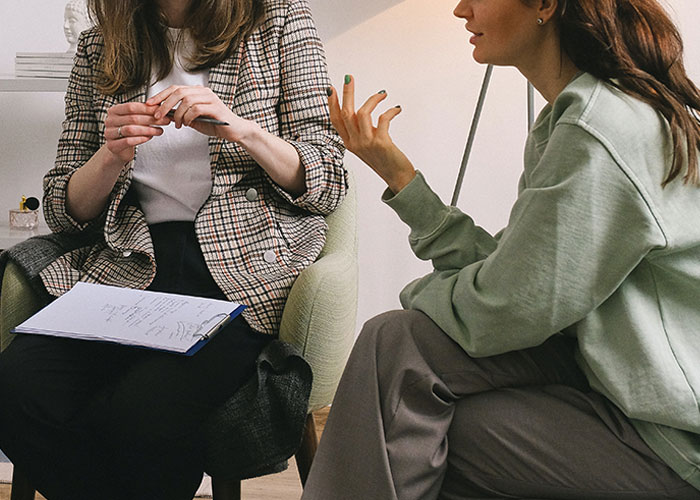 Not a teacher, but in higher education-- They really really want guidance. A scary amount of guidance. I don't know anyone else's experience, but when I was a kid and had a question my parent's couldn't answer, they would say "well, there are three sets of encyclopedias down the hall and you have a library at school. Figure it out. "
Not a teacher, but in higher education-- They really really want guidance. A scary amount of guidance. I don't know anyone else's experience, but when I was a kid and had a question my parent's couldn't answer, they would say "well, there are three sets of encyclopedias down the hall and you have a library at school. Figure it out. "
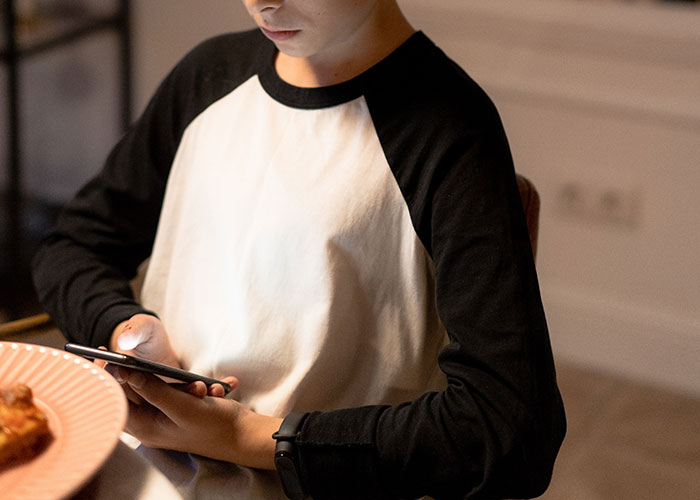 1. Lack of persistence. This is loosely correlated to [instant gratification conditioning.](https://link.springer.com/article/10.1023/B:EDPR.0000012344.34008.5c) If they can't figure something out on the first try, they require hand-holding for each step. And if they get frustrated with the hand-holding, they give up.
2. Fear of taking risks. Related to #1, helicopter parenting, and the cultural effects of high stakes testing. For example, a colleague asked if I could pick up his son and take him to lessons because he didn't trust the kid to make it on his own. The kid is 13, and the lessons are a one mile walk from his school through a safe neighborhood.
3. Tech dependent, not tech savvy. Kids who can tell you every YouTube video they've watched this week, and how to download extra skins on Minecraft, but don't know how to use a printer, or how to get anywhere without Google Maps.
4. Lack of problem solving skills. This is directly related, IMO, to all three of the first issues.
1. Lack of persistence. This is loosely correlated to [instant gratification conditioning.](https://link.springer.com/article/10.1023/B:EDPR.0000012344.34008.5c) If they can't figure something out on the first try, they require hand-holding for each step. And if they get frustrated with the hand-holding, they give up.
2. Fear of taking risks. Related to #1, helicopter parenting, and the cultural effects of high stakes testing. For example, a colleague asked if I could pick up his son and take him to lessons because he didn't trust the kid to make it on his own. The kid is 13, and the lessons are a one mile walk from his school through a safe neighborhood.
3. Tech dependent, not tech savvy. Kids who can tell you every YouTube video they've watched this week, and how to download extra skins on Minecraft, but don't know how to use a printer, or how to get anywhere without Google Maps.
4. Lack of problem solving skills. This is directly related, IMO, to all three of the first issues.
I would install GPS in my brain if I could. I am "directionally challenged ". Until I go somewhere several times, I use GPS. All the streets in my old subdivision were "Park something " Lived there 7 years and still got turned around. I wouldn't let my kids walk that far alone. Neighborhood might be safe, but things happen. But that's me
 Not a teacher in the strictest sense, but I do a lot of tutoring, and I briefly taught some junior comp eco courses at the local elementary school. The biggest thing I’ve noticed is an over abundance of “lawnmower” parents—parents who plow down any obstacle in their kids’ paths without ever letting them challenge themselves. I had parents who would do their kids’ assignments for them because they were “hard,” then yell at the instructors when their children weren’t learning.
The other big thing is that knowledge of proper grammar seems to have really decreased. I know high school honors students who can barely string together a coherent sentence. I read and edit essays/resumes/research papers sometimes, and they were often borderline illegible because nobody knew basic spelling and punctuation. I had to actually teach people—some of whom were in AP English classes—that you need to capitalize proper nouns and put quotes around dialogue. People also don’t know how to use word processors for some reason—loads of students had no idea how to even center text, so they’d just press space until their titles were roughly in the middle of the paper.
Not a teacher in the strictest sense, but I do a lot of tutoring, and I briefly taught some junior comp eco courses at the local elementary school. The biggest thing I’ve noticed is an over abundance of “lawnmower” parents—parents who plow down any obstacle in their kids’ paths without ever letting them challenge themselves. I had parents who would do their kids’ assignments for them because they were “hard,” then yell at the instructors when their children weren’t learning.
The other big thing is that knowledge of proper grammar seems to have really decreased. I know high school honors students who can barely string together a coherent sentence. I read and edit essays/resumes/research papers sometimes, and they were often borderline illegible because nobody knew basic spelling and punctuation. I had to actually teach people—some of whom were in AP English classes—that you need to capitalize proper nouns and put quotes around dialogue. People also don’t know how to use word processors for some reason—loads of students had no idea how to even center text, so they’d just press space until their titles were roughly in the middle of the paper.
This! The grammar, OY! I remember diagraming sentences in 5th grade, and now, I see the damn incorrect overuse of the apostrophe everywhere! 🤦🏽♀️
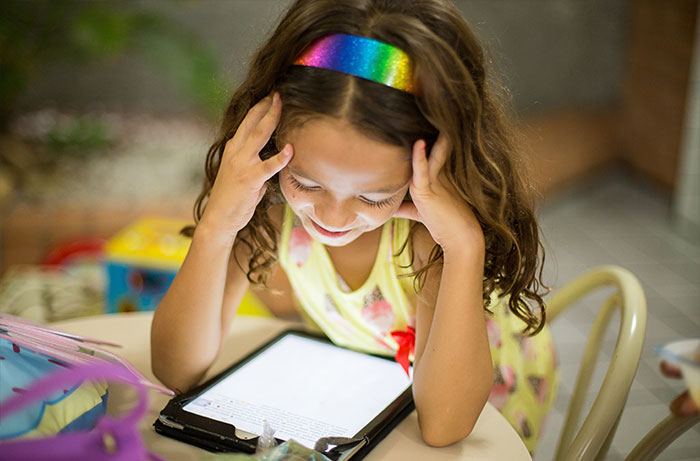 Lawnmower parents, more emphasis on test scores, and more reliance on technology. Less interest in learning and too much interest in social media.
Lawnmower parents, more emphasis on test scores, and more reliance on technology. Less interest in learning and too much interest in social media.
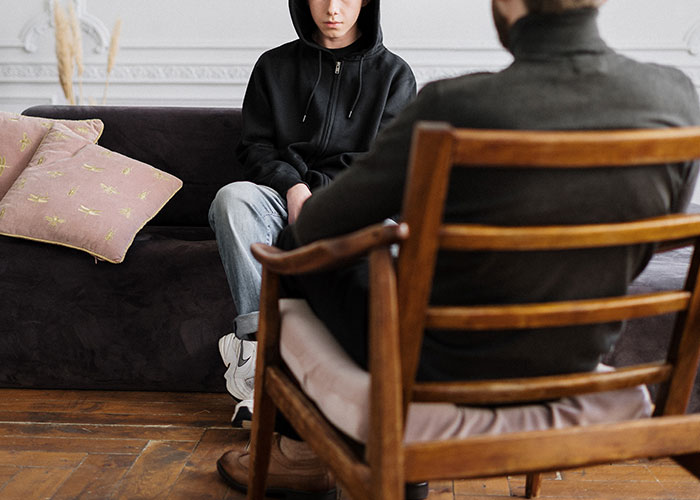 Mental health. Each semester, I refer at least two or three students per class to campus counselling services.
A couple add-on observations:
- Students obviously now feel much more comfortable talking to their professors about their personal issues. I believe in educating the whole student, so I am OK with this. Also, I legitimately believe students have more stress on their plates now than they did 20 years ago. Increased competition, a weakening (North American) economy, climate change anxiety, the impacts of social media on self-worth, etc.
- At least 50% of the students I refer to counselling have already gone. I am impressed at the proactive nature younger people are taking with regards to their mental health. I agree that the stigma around mental health is decreasing, which I support.
Mental health. Each semester, I refer at least two or three students per class to campus counselling services.
A couple add-on observations:
- Students obviously now feel much more comfortable talking to their professors about their personal issues. I believe in educating the whole student, so I am OK with this. Also, I legitimately believe students have more stress on their plates now than they did 20 years ago. Increased competition, a weakening (North American) economy, climate change anxiety, the impacts of social media on self-worth, etc.
- At least 50% of the students I refer to counselling have already gone. I am impressed at the proactive nature younger people are taking with regards to their mental health. I agree that the stigma around mental health is decreasing, which I support.
 First off, the kids are essentially the same--it is the parents who are far more immature. They want to be "buddies" with their kids instead of being, well, parents, so discipline is far worse. Kids know they won't be punished at home so the push the envelope at school. Parents are also making far worse decisions in raising their kids--have your family take a week long vacation in September while your child is flunking my class? Sure! That was unthinkable 10-20 years ago.
That said, students have far more distractions now. With the Internet and cell phones, kids no longer talk or even engage with each other in the halls or at lunch. As a result, school activities are suffering as kids now have that damn phone to entertain them after school. This has led to a generation of narcissistic kids that think not only that their **** don't stink, but that we should share in their gift.
First off, the kids are essentially the same--it is the parents who are far more immature. They want to be "buddies" with their kids instead of being, well, parents, so discipline is far worse. Kids know they won't be punished at home so the push the envelope at school. Parents are also making far worse decisions in raising their kids--have your family take a week long vacation in September while your child is flunking my class? Sure! That was unthinkable 10-20 years ago.
That said, students have far more distractions now. With the Internet and cell phones, kids no longer talk or even engage with each other in the halls or at lunch. As a result, school activities are suffering as kids now have that damn phone to entertain them after school. This has led to a generation of narcissistic kids that think not only that their **** don't stink, but that we should share in their gift.
 Computer Science teacher here. There has been a definite move over time from trying to learn how to do something towards trying to find a ready made answer. Whenever I set my students an assignment, we discuss what they should do if they get stuck - typically involving re-reading notes, looking at the resources they've been given, looking at prior work, perhaps finally using web based resources. Students have always (as long as the web has been a thing) skipped straight to the last one, bit the subtle change is rather than searching for HOW to do something, most now just search for a fully formed complete answer which they can copy and hand in.
Computer Science teacher here. There has been a definite move over time from trying to learn how to do something towards trying to find a ready made answer. Whenever I set my students an assignment, we discuss what they should do if they get stuck - typically involving re-reading notes, looking at the resources they've been given, looking at prior work, perhaps finally using web based resources. Students have always (as long as the web has been a thing) skipped straight to the last one, bit the subtle change is rather than searching for HOW to do something, most now just search for a fully formed complete answer which they can copy and hand in.
 I’ve noticed that students don’t read as much. I used to read all sorts of books when I was young, and I believe that I’m a better writer for it. I fell in love with Steinbeck in 9th grade and read his works multiple times. How can you learn to write if you’ve never read great writing?
I’ve noticed that students don’t read as much. I used to read all sorts of books when I was young, and I believe that I’m a better writer for it. I fell in love with Steinbeck in 9th grade and read his works multiple times. How can you learn to write if you’ve never read great writing?
I'm an avid reader, several books a week. I reread if I have nothing new. Both kids love to read & both write. Youngest does custom stories and writes D&D stories. She is a fan of Shakespeare and Sherlock Holmes & introduced me to several series I wouldn't have read otherwise. Can't live without books
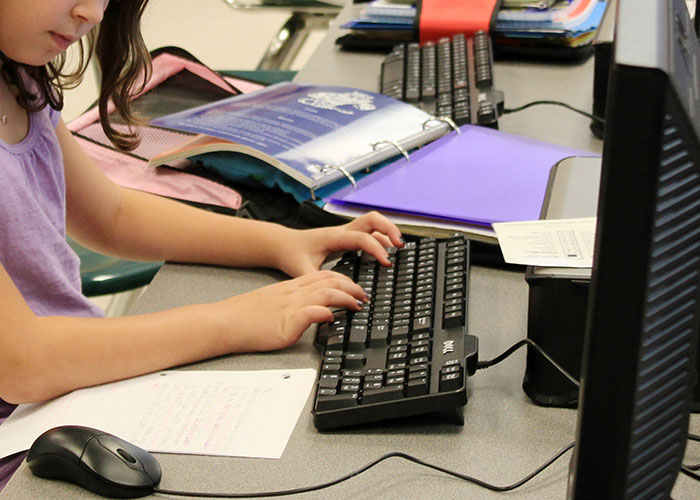 They're more alike than different, but students of 1999 were more likely to be able to write their own web page in raw HTML, and students in 2019 aren't sure how to make a basic Powerpoint or attach something to an email. I've been doing this long enough that I remember when the professors were baffled by all things computer-ish and the students were impatient with how clueless we were, and now it's reversed.
That, and even my smart students have zero idea how to use an apostrophe. That's something that's shown up in the past five to seven years. I blame autocorrect.
Edit: Thought of a couple more. In 1999, there was a hum of chatter with occasional outbreaks of laughter before class started, and I had to quiet them down to begin. Now there might be one or two people talking, but everybody else is glued to their phone. Also, back then there was a lot of flirting before class, and male and female students mixed and sat next to each other. Now it looks like an eighth grade dance: females on this side, males on that.
Edit: OK, two more, and then I'm done. In 1999, my female students tried to dress nicely for class, and my male students showed up in sweats and a t-shirt. Complete reversal now: the males dress fashionably and the females wear sweats and hoodies. And in 1999, just about everybody wore a baseball cap -- when it came time to take a test, I had to tell them to turn it around or take it off, not because I thought they might have answers written in the bill, but because I needed to see where their eyes were. When I gave that instruction, hats were turned on all but one or two heads; it was just as much part of the college student uniform as a backpack. These days, I might have one student in a ball cap once or twice a term. I think everybody puts more effort into their hair.
They're more alike than different, but students of 1999 were more likely to be able to write their own web page in raw HTML, and students in 2019 aren't sure how to make a basic Powerpoint or attach something to an email. I've been doing this long enough that I remember when the professors were baffled by all things computer-ish and the students were impatient with how clueless we were, and now it's reversed.
That, and even my smart students have zero idea how to use an apostrophe. That's something that's shown up in the past five to seven years. I blame autocorrect.
Edit: Thought of a couple more. In 1999, there was a hum of chatter with occasional outbreaks of laughter before class started, and I had to quiet them down to begin. Now there might be one or two people talking, but everybody else is glued to their phone. Also, back then there was a lot of flirting before class, and male and female students mixed and sat next to each other. Now it looks like an eighth grade dance: females on this side, males on that.
Edit: OK, two more, and then I'm done. In 1999, my female students tried to dress nicely for class, and my male students showed up in sweats and a t-shirt. Complete reversal now: the males dress fashionably and the females wear sweats and hoodies. And in 1999, just about everybody wore a baseball cap -- when it came time to take a test, I had to tell them to turn it around or take it off, not because I thought they might have answers written in the bill, but because I needed to see where their eyes were. When I gave that instruction, hats were turned on all but one or two heads; it was just as much part of the college student uniform as a backpack. These days, I might have one student in a ball cap once or twice a term. I think everybody puts more effort into their hair.
This made me giggle. My dad was a computer nerd from day one. He insisted that I know how to break down and rebuild a system, knew how to use DOS and Keep up on new tech. I really appreciated that. Before word processors became a real thing, I would write my home work using very basic DOS commands. Being able to turn in my papers on dot matrix computer paper was ballin back then lol. Today? I hardly ever use my computer in favor of my phone. lol
 I was a university advisor for many years and now I’m an adjunct professor. Students today refuse to use their textbook/take notes to their detriment. They’ll turn in papers with applications of definitions/concepts they found by googling as opposed to ones discussed in class or in the text. It’s amazing how much research they’ll do that goes against what has been taught (and is easily at their fingertips).
I was a university advisor for many years and now I’m an adjunct professor. Students today refuse to use their textbook/take notes to their detriment. They’ll turn in papers with applications of definitions/concepts they found by googling as opposed to ones discussed in class or in the text. It’s amazing how much research they’ll do that goes against what has been taught (and is easily at their fingertips).
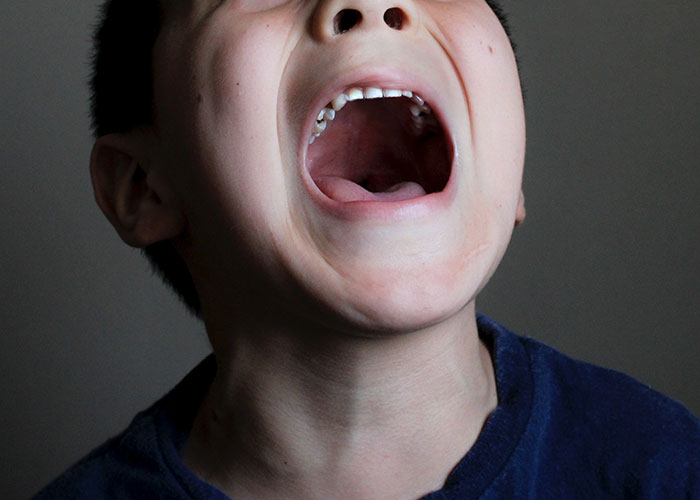 Students lack the tenacity to stick with a task until they figure it out. Most will try once and if they aren’t perfect will give up and blame the teacher if they can’t do it. I teach physics, 11th grade, they want me to grade each step of each problem before they move forward. And if I don’t, some throw temper tantrums.
Students lack the tenacity to stick with a task until they figure it out. Most will try once and if they aren’t perfect will give up and blame the teacher if they can’t do it. I teach physics, 11th grade, they want me to grade each step of each problem before they move forward. And if I don’t, some throw temper tantrums.
Gen X here. I mean, there's no excuse for temper tantrums, but isn't helping your students through a complex problem kinda like... teaching?? And if, as a whole they don't feel confident in their progress, maybe you're actually the problem, as that's your job? Just sayin.
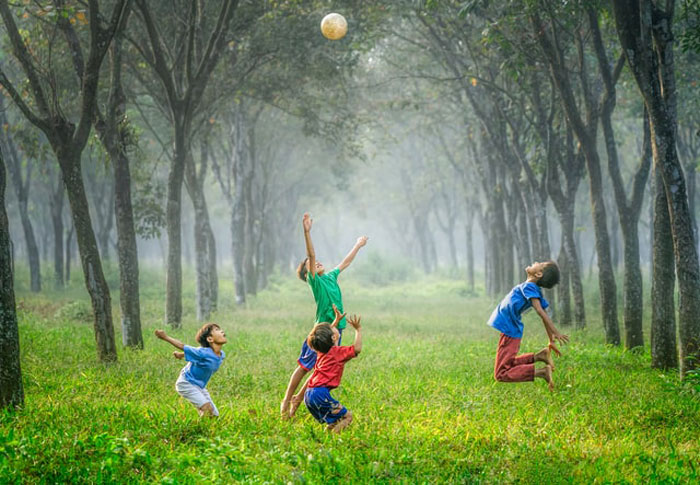 Physical education teacher here. Watched a steady decline in fitness test scores over the years. Kids were in far better shape 20 years ago. Over the last 5 I’ve seen a dramatic dip in fitness in elementary age kids. Fewer outliers on the top end and far more kids on the low end. We do the PACER cardio test. We might have 1-2 kids in the whole building fail the pacer 10 years ago. I now see approx.18% of student fail it. (You can almost walk the first 8, passing for most boys is 23 and 15 for girls. Also used to 10-15 % of student over 65. I think we had 2 in the whole group that was tested. (About 400) We’ve also see strong correlation between fitness scores and “end of grade” testing. Usually the students with better cardio fitness do better on testing and those with lower scores do worse on EOG’s. In theory if we can boost their fitness scores we can boost their EOG’s. We will see a major health crisis in 30-35 years. With a strong rise in preventable disease, due to inactive lifestyle.
Physical education teacher here. Watched a steady decline in fitness test scores over the years. Kids were in far better shape 20 years ago. Over the last 5 I’ve seen a dramatic dip in fitness in elementary age kids. Fewer outliers on the top end and far more kids on the low end. We do the PACER cardio test. We might have 1-2 kids in the whole building fail the pacer 10 years ago. I now see approx.18% of student fail it. (You can almost walk the first 8, passing for most boys is 23 and 15 for girls. Also used to 10-15 % of student over 65. I think we had 2 in the whole group that was tested. (About 400) We’ve also see strong correlation between fitness scores and “end of grade” testing. Usually the students with better cardio fitness do better on testing and those with lower scores do worse on EOG’s. In theory if we can boost their fitness scores we can boost their EOG’s. We will see a major health crisis in 30-35 years. With a strong rise in preventable disease, due to inactive lifestyle.
 The need for instant gratification due to technology; they have a harder time engaging in critical thinking activities because of standardized testing; better entrepreneurs (always bargaining to get the best for them).
The need for instant gratification due to technology; they have a harder time engaging in critical thinking activities because of standardized testing; better entrepreneurs (always bargaining to get the best for them).
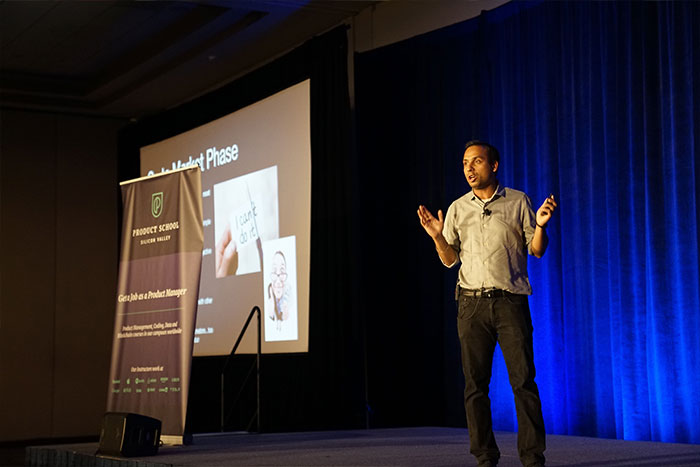 In 2009, kids were blown away if you could reference online memes. Nowadays, not so much. They’re more likely to sneer and call you a boomer.
In 2009, kids were blown away if you could reference online memes. Nowadays, not so much. They’re more likely to sneer and call you a boomer.
 I work in a college and hear the stories of professors.
While students are obsessed with grades and bugging the professor on what they have the minute you say "i have your grades, come to my office between 11 and 1 and get it and if your missing anything ill let you know" not a soul showed up - no emails saying "hey i have classes then can i come in at a different time?". Students have been drying in professors offices over grades and its not the ones who really do try but just dont get it - its the ones that are missing 2 labs, 10 homework assignments, and missing quizzes but feel they deserve a C in the class because they show up ALMOST every day.
During labs and such like others have said they dont read instructions or if it doesn't explicitly SAY something they wont do it (like turn the meter on sorta thing)
Professors have had parents call their office demanding to know what their childs grade is. Professors have to remind them that your child is over 18 and legally an adult i cannot divulge that information to you. Or parents want to know why their kid is almost failing their class and why they are making the class so hard.
I work in a college and hear the stories of professors.
While students are obsessed with grades and bugging the professor on what they have the minute you say "i have your grades, come to my office between 11 and 1 and get it and if your missing anything ill let you know" not a soul showed up - no emails saying "hey i have classes then can i come in at a different time?". Students have been drying in professors offices over grades and its not the ones who really do try but just dont get it - its the ones that are missing 2 labs, 10 homework assignments, and missing quizzes but feel they deserve a C in the class because they show up ALMOST every day.
During labs and such like others have said they dont read instructions or if it doesn't explicitly SAY something they wont do it (like turn the meter on sorta thing)
Professors have had parents call their office demanding to know what their childs grade is. Professors have to remind them that your child is over 18 and legally an adult i cannot divulge that information to you. Or parents want to know why their kid is almost failing their class and why they are making the class so hard.
The parental thing is the one that still blows my mind. When I first started teaching, I'd have a couple parents -- ALWAYS the parents of boys in my experience -- complain. Now, every single goddamn term, I have some mom or dad acting like because they're paying the bills, their kid's education is like a goddamn fast food burger and they "have the right" to demand it "their way" and "get what they're paying for!" Goody for you, but legally I can't and won't tell you anything. With online classes? Even worse. These assholes INTERRUPT CLASS to make these demands. No, parents, I do NOT work for you, and no, you do NOT "pay my bills" by any stretch.
 Students now seem to stay away from politics and activism completely because they don't know who to trust. İt's very sad. Becoming engaged with the world beyond ones family and hometown through political activism used to be a important -- perhaps the most important - part of university. İt is not that students now are apathetic, they are just being told that everything is 'fake news' and so they don't want to feel 'duped' into being passionate about issues that might not be real.
Students now seem to stay away from politics and activism completely because they don't know who to trust. İt's very sad. Becoming engaged with the world beyond ones family and hometown through political activism used to be a important -- perhaps the most important - part of university. İt is not that students now are apathetic, they are just being told that everything is 'fake news' and so they don't want to feel 'duped' into being passionate about issues that might not be real.
I don't recall giving one flying c**p about politics or social issues until I started paying taxes and that was the popular position among my peers. Activism has always been the exception among youth. I remember being forced to do c**p outside the class in Government because "get involved" and hating every minute of it 20+ years ago. If anything kids are more aware and passionate about "issues" than ever before thanks to social media.
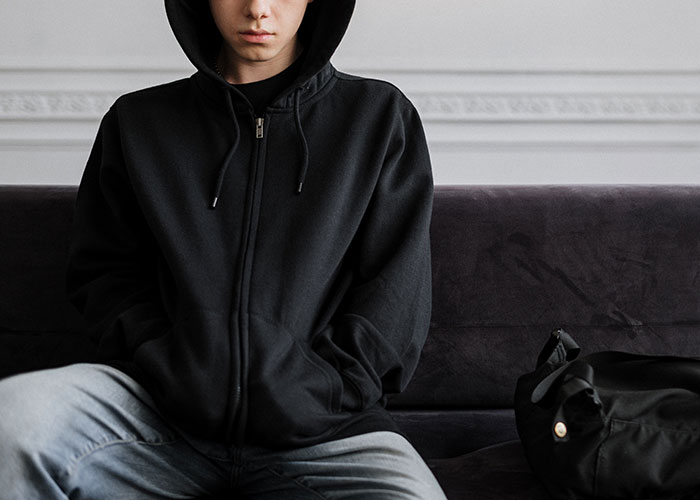 Two words: anxiety and technology.
College teacher since 1999 👩🏫
Two words: anxiety and technology.
College teacher since 1999 👩🏫
Swearing amongst children I think has gotten worse. I've heard 1st-hand of what a 'lower-demographic' pupil has said to a teacher and it was horrificly-sexual. Not sure if the pupil was a girl or a boy. I have heard a 'lower-demographic' father saying the same sort of thing to his (cute-sounding) son walking past my house as well, when the son wa complaining another schoolkid picking on him. Very horrific and very sad. (South of England)
When I taught (having a break to do a masters), I never disguised the fact that I was gay and it wasn't a big deal. That, in itself, is notable, I think. We had a few teachers who made no effort to hide their gayness (by which I mean students sometimes ask what we did at the weekend or if we were married or anything and I'd mention my fiancé - normal conversational stuff) and we had a trans woman on staff. This is in a small town with students who generally had a low level of education or were previously kicked out of other places. I cannot imagine that being the case 20 years ago. The worse homophobic comments I've heard have actually been from older staff but I am ballsy enough to ask them to repeat what they just said in a "try it and we both know you'll end up in a disciplinary" voice. That's absolutely magical. But yeah, being gay, and to a lesser extent being trans or non-binary, has been hugely normalised in the younger generations.
I'll weigh in on this. Began my career in 1998. Taught in two states. The first big and obvious change is technology. The digital life of my students is robust. They communicate with people--and especially their parents--with total ease and some degree of authority. If something happens--a fight, a disagreement, a lockdown drill, a bad grade--the school will hear about it in 20 minutes, not 24 hours. Additionally, with tech comes the issues of cyberbullying, threats, and general drama that sometimes makes it to the school environment. It's what was always happening, just amplified. Lastly, your whole sense of education shifts when facts and figures can be checked instantly. Dates and people's names are easy referenced. Concepts still need the classroom environment. And let's not get started on how email changed everything. The second issue is that kids today seem way more sensitive to social justice issues. Over the period of years, most of my students have become savvy, aware, woke. They are just better citizens, at least in classroom discourse. Of course, there seems to be a greater sensitivity too. I've come to be very careful in my language and assumptions lest I feel the wrath of several 15-17 year olds setting me straight. But I love that they do. Why shouldn't a student correct a teacher. Are they happier? Probably not. Are they still kids.? Yes, they are still kids. I would never underestimate the power and creativity of kids from this generation. However, I wouldn't assume that just because the world is at their fingertips, they have a good grasp of it. The brain only matures as biology tells it and if scientists are right, 25 is the end of childhood. Just when I started teaching.
Got to the thread too late to realistically read through all of them before posting, so apologies if there is any repetition in my comments. I started in higher ed six years ago and have noticed plenty of functional type differences that may not be immediately obvious. For instance, when I attended college in the 90s email wasn't used as a primary method of communication. It was still seen as a semi-exotic analog to snail mail. Now that it (and other electronic, digital, and wireless means of communication) are in wide use, showing up to see a class cancellation notice on the door isn't seen as a gift from the gods, but as a justification for students to complain that they made a "pointless trip" to the classroom. Instead of being grateful for an extra hour off, many of students will become indignant that they walked/drove "all the way over" to a certain part of campus/a particular building/campus. I've also noticed what I believe to be more "blur" about what constitutes plagiarism. Obviously, we warn against it, remind students of that warning, and make sure to define what plagiarism is. But, for whatever reason, they think that uncited CTRL-C + CTRL-V does NOT equal plagiarism. It seems as if they think the only way making an exact copy of someone else's work is if it is done by hand...as in literally writing it by hand. If it's type, and especially copied and pasted, it's OK. And, finally, the belief that having your ear buds in during class (presumably to listen to music) is perfectly normal and acceptable seems to be almost universal. Even though it was 25 years ago, we had the technology to do the same thing. But, barring some bizarre exceptions, we all understood that it wasn't appropriate. Today, a large proportion of students seem to be seriously considering it worthy of an argument if you ask them to take them out (I only ask during tests or if their "content" is spilling out of their ears and into the room. Yes, it happens from time to time.) Another odd complication that wasn't even possible "back in my day" (LOL...it seems odd to even type that) is the use of laptops to take notes. I don't mind. I even suggest it...with the explicit and heavily emphasized warning that if you're caught watching cat videos, or whatever, I'll ask you to quit using it. I'll never forget the exchange I had with one student who forgot to mute their laptop and started a YouTube video. It loudly interrupted class. I asked them to mute their laptop and reminded the student that I'd ask them to not have their laptop out if they couldn't exert some discipline (in a real world sense, all I was asking was the courtesy of having the volume turned down as I can't see their screens when I'm lecturing). Ten minutes later, the SAME STUDENT has an autoplayed Facebook video create the same situation. They didn't mute the laptop, they just quit looking at what they thought got them caught. So, I asked them to put the laptop away. "How am I supposed to take notes?!" was the indignant reply. I pointed out that that wasn't what she was doing, that class had already been loudly interrupted twice, that I'd already given her a pass on something I'd given a preemptive warning about, and pens and paper still existed. Still, the combination of "how dare you" and "what am I supposed to do now" was all over her face and body language. Also, on the days when I give a small quiz (intended to encourage attendance and reading of the textbook), make use of a slide show, or have a significant amount of things written on the board, I can't help but notice how many students rely on the cameras on their phones to substitute for "note taking." I've told them that it can't hurt to do so. In fact, I think it is a useful supplement. But, no matter how many times I explain it, I'll have a half dozen students a semester who stare into the distance and/or look like they are sleeping with their eyes open UNTIL the moment I advance a slide, pick up the eraser, etc. All of the sudden, they perk up and their head is on a swivel. They can pick up their phones and snap pictures of the board/boards and/or screen faster than a Old West gunslinger could draw his revolver. Just some random observations. I think some of what I mentioned is a result of some of my classes being filled with first year freshman who are treating college as being in the 13th grade. That's especially true in the fall semesters. Given that we're in the middle of one, that's probably why all that comes to my mind so easily now. Hahaha!
I was in college in the early oughts. My commute was about two hours round trip, and there were times when I would only have one class for the day. You better believe I would have been pissed not to have received an email if the class was cancelled. That's nothing new. Sorry you didn't have email in the 90's, but some things change for the better.
 I began teaching in 2003, so I'll try to answer.
Kids are the same. The difference is mainly that they have their phones in class now. That's about it.
I began teaching in 2003, so I'll try to answer.
Kids are the same. The difference is mainly that they have their phones in class now. That's about it.
I feel like this is the most correct answer on this entire thread.
 I work at a university and have discussed this many times with many different profs. One thing that keeps popping up is that students seem less willing to put effort into [actively] learning. They now expect professors to teach them everything. If a student somehow doesn't understand something, they blame the profs instead of their own lack of effort. They seem to think learning is some passive thing that happens, that showing up for lecture and doing homework is somehow sufficient to master the material.
I work at a university and have discussed this many times with many different profs. One thing that keeps popping up is that students seem less willing to put effort into [actively] learning. They now expect professors to teach them everything. If a student somehow doesn't understand something, they blame the profs instead of their own lack of effort. They seem to think learning is some passive thing that happens, that showing up for lecture and doing homework is somehow sufficient to master the material.
And this is one of the many reasons why students should not be allowed to score teaching staff.
Students in 2009 gave absolutely zero f***s Students in 2019 give waaayy too many f***s
Nearly two decades in, this is what I've noticed: Students are more supportive of each other and less judgemental. Kids are often lauded for things that would have gotten them bullied in the past. Everything school related is viewed in the context of college applications, where the goal is to check as many boxes as possible. Fewer and fewer kids giving themselves a chance to find something academic they are passionate about and allowing themselves the time to engage with it. Far more stressed out and sleep deprived. This is a chicken vs. egg thing, as the two create a postivie feedback loop. The lack of a more formal dating structure due to hangout/hookup culture and always on rumor-mill of the internet have made it even more confusing and emotionally fraught for teenagers to navigate romantic relationships and as a result, there has been a reduction in students involved in romantic relationships.
A couple of observations as both a parent and a substitute teacher: 1) No one teaches handwriting anymore. Everything is done on a computer, so no one emphasis spelling (spellcheck), handwriting or even proper grammar. 2) For better or worse, more kids are getting diagnosed with some sort of mental health illness or are on the spectrum. In some ways this is better, because they get the help they need. On the other hand, it creates a bit of a mess as kids are getting segregated and it's difficult to teach.
To be fair a lot of us adults now likely had mental illness and behavioral issues that were never addressed. Example being, if mental health actually mattered back in 2000 I'd have known earlier on I had ADHD and could have been treated for it, instead of spending most of my life struggling and thinking something was wrong with me because I couldn't focus.
 Pop culture references.
1999: Ferris Beuller's Day Off
2009: Twilight and all things vampire
2019: Fortnite dances and memes
Pop culture references.
1999: Ferris Beuller's Day Off
2009: Twilight and all things vampire
2019: Fortnite dances and memes
Downvotes galore coming!!! Fortnight is trash. Give me the Battlefield franchise *any* day! ;)
Teacher of 15+ years here. Cell phones. These kids’ brains are exactly the same as their predecessors, except this generation have unlimited telepathy, information, and porn. It’s like having a superpower, along with the complacency and disregard for authority that any superpower would probably confer on its possessor.
I'm a student teacher in an upper elementary school classroom. The students are much more accepting of students who receive special education services, and they make efforts to include the students who are still learning English too. Attention spans are shorter, especially for students in the younger grades. When I worked with third graders, they could only receive twenty minutes of direct instruction before they lose focus. We would have to take quick brain breaks (dancing, games, etc.) after those twenty minutes. Even though they have more advanced technology, my current students aren't as capable with laptop computers as we were in 2009. They learned to type in third grade just like we did, but most type very slowly because they only use one hand or one finger. They were amazed at how fast I type and how I can type without looking at the keyboard or the screen. They're also not so good with memorizing, but that could be due to the lower amount of assigned homework and/or varied math strategies that don't require as much memorization (e.g. with multiplication) as traditional algorithms do (e.g. long division).
I can't speak to 1999, but I was TAing college in 2009 and currently teach high school (juniors and seniors). Some of the most distinct changes are below. (These were present in 2009 and 2010 (my first year of high school teacher) but rarely. Now most of these things are happening daily/with most students) 1. Students are much more open about sex/drinking. It is nothing for students to talk about a kegger in front of me and when I remind them that I can hear them, they blow me off. 2. Grades are the most important thing in the entire world and there is a bigger disconnect in grades and understanding. There is a lot of 'I tried really hard, I deserve an A' even though they fully admit they didn't understand the work. 3. There is desire to know what is going on. If I forget one night to post the homework on the google website they simply don't do the homework (even if it is listed on the syllabus, was on my whiteboard, and was verbally stated) 4. There is no desire to look up information on their own. I am constantly asked for extra practice worksheets - so I tell them to google them if I am busy and can't do it that second. Students almost always respond with 'But I tried that and couldn't find anything'. I then google 'Balancing Equations Practice Problems' on their device and show them how the entire first 3 pages of google are practice problems. 5. And the biggest one is having absolutely no idea the power of their technology. In 2009/2010, every student who had a TI-83 calculator knew how to use it, could program games into it (since this was before every kid having a smartphone), and knew how to use it to cheat. Now the $100+ TI calculators are simply used as fancy basic calculators. They are shocked when I show them how to program in basic numbers or use a built in app. Even on their Iphone calculator, most of them didn't know if you tilted your phone sideways it became a scientific calculator.
Ooh I want to know how to program a game into a calculator. Must hold someone hostage until I know how! >:)
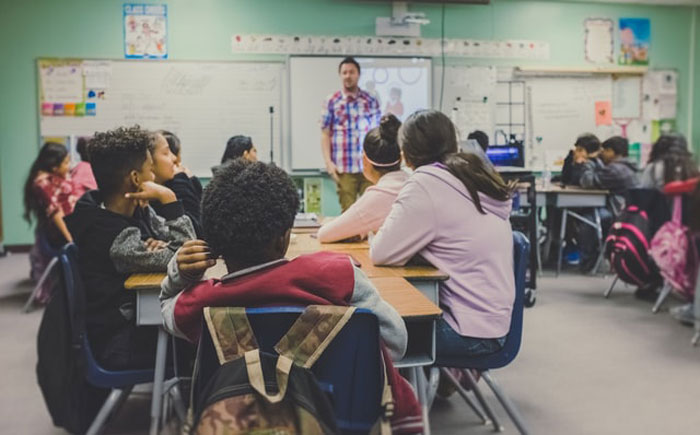 Nothing really. I can only speak for the previous 13 years. I still use the same damn jokes but I just change the references to more recent movies or music. I use slightly different websites but how i interact online or off hasnt changed. I guess there's been a decline in general English ability but that's because English isnt emphasized like it used to be.
Nothing really. I can only speak for the previous 13 years. I still use the same damn jokes but I just change the references to more recent movies or music. I use slightly different websites but how i interact online or off hasnt changed. I guess there's been a decline in general English ability but that's because English isnt emphasized like it used to be.
 2019 college students couldn’t care any less about fun social events on campus. They would rather do everything online.
2019 college students couldn’t care any less about fun social events on campus. They would rather do everything online.
Polisci teacher here. Biggest difference is students asking for a specially created extra credit assignment (wtf?) rather than being satisfied (or informing themselves) with semester long support, feedback, and extra credit opportunities. Newsflash: I love all my kids but I cant/wont/shouldn't create special additional assignments for everyone. I should (and can and do) create exceptions for accommodations and exceptional circumstances. Even for the "ordinary exceptions" like illness, accident, or even a breakup. But aint no one gonna make an exception cause you failed to access all the resources that you were repeatedly told about, reminded about, and failed to show up for. It's been suggested that this was a change in k-12 with common core (I'm at the college level). K-12 teachers, any insight into why I get freshman who think this way?
Common core. Unrealistic expectations that disregard actual brain development per age. It broke my brilliant daughter.
I've been a teacher for eleven years in Elementary School. Two things that called my attention the most in comparing kids from 2009 and 2019 are that kids from 2009 seemed calmer. Usually I'd have one or two problematic students, but now it's usually 1/3 of the class or more. The second thing is that parents give us way more hard time than before. In 2009 you could contact a parent about not doing homework or classroom activities or misbehaving and you'd usually have them by your side teaching the child she must be respectful and obey teacher's instructions. With time this has changed drastically to parents taking the kid's side and telling US to be patient because "there are a lot of problems" at home the child is facing. Or just because they think the teacher must put on a show to entertain their child, never punish misbehavior and just let them free to do what they want.
Engineering professor here. There are some statistical trends that should be noted: 1. Older professors are not as effective of instructors - there are many suggested reasons, I like the explanation that they are further removed from understanding the students' knowledge base and have greater difficulty covering material at the proper depth. Not that it can't happen. 2. Older professors know more than they did as younger professors. They get surprised by new information less often, and therefore get the impression that the students of "today" are not as smart as the ones of "before". I will say, there are more women and underrepresented minorities now. That's a great thing. Also, there has been an explosion in engineering enrollment in the past 10 years. That's a great thing - society needs them. Students are less open to paying for books, they want free pdfs or ebooks. Other than that, they are exactly the same. Kids are kids.
I teach high school. Fifteen years ago, the minutes before the bell was a time where kids would talk to each other and goof around. Now, it’s absolute silence. The kids are checking their cell phones.
That first semester of college is a thousand times lonelier than it was 20 years ago. Used to be you'd walk into the dining hall, look around, and see faces you knew from class. They'd wave you over. Now the dining hall is just the tops of heads. Everyone has their face in their phone. They're sitting alone. 1999 = every semester, a student ends up crying in your office 2019 = every WEEK, a student ends up crying in your office
I just had a conversation with a teacher friend about this. She said that the biggest difference is the level of precaution that teachers have to take now, and how the circumstances surrounding it have managed to feed on themselves. Example: Child is (or feels) slighted in some way. Parents are more aggressive about attacking teachers about this than in years past. To add to that, because of increased communication (cell phones, instant messaging, etc.), the parents are alerted of these incidents more quickly and (because of the first item - parents being more likely to defend the child) more frequently. So: parents lash out at teachers more often, over smaller incidents. Children know this, and thus, alert their parents more often. They also have the increased capacity to do so...they could simply text their parents in class if they feel slighted, whether warranted or not.
I always knew which type of parent I had the second they said "MY child ..." Uh oh.
Teaching for 11 years now. When I started teaching, students were waaaay more competent with basic computer skills. Smartphones have killed a lot of this. Typing on a keyboard is slower, many don't know how to put attachments in an email... It's weird to see students get worse with technology over time.
they are not worse. they are used to a different kind of technology. they can type really fast on their smart phones touch screens. that‘s not a bad thing, just a different technology for writing. do my grandparents know how an mp3 player works? no. do millennials know how to use punched card data processing? do i know how to use the features of tiktok? not really. not saying either of us couldn‘t learn it. but different generations grow up with different tech. always have been, always will. not an inherently bad thing.
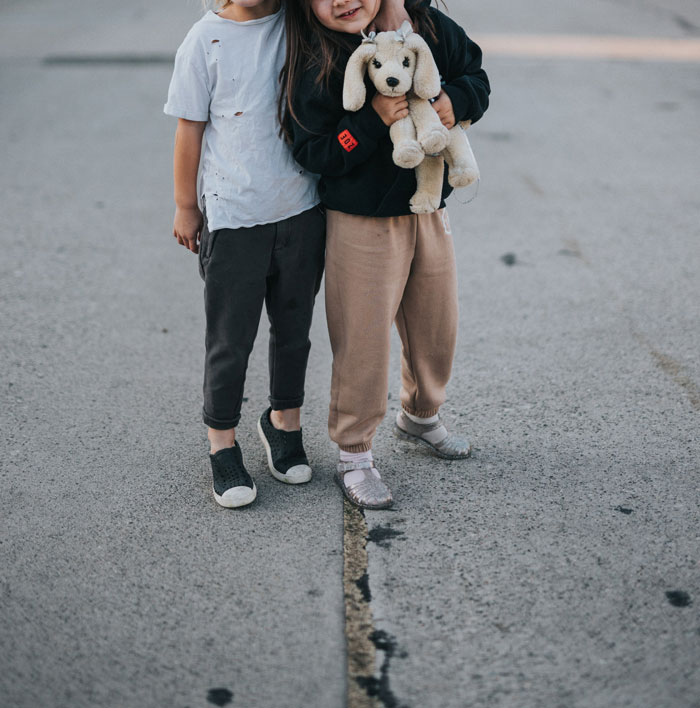 Sorry not a teacher but a family friend who has been teaching a little over 30 years now once said kids today are bigger (in size) and their clothes are smaller while in the past they were a lot smaller while their clothes were bigger/baggier.
Sorry not a teacher but a family friend who has been teaching a little over 30 years now once said kids today are bigger (in size) and their clothes are smaller while in the past they were a lot smaller while their clothes were bigger/baggier.
I’m a highschooler. as much as i want to complain about grumpy old boomers, these are nearly all true. i see it every day. my mom was an english teacher, so i have a pretty good handle on grammar usage. we are sophomores btw - my classmate asked what a verb was and where the apostrophe goes in “They’re”, all in one sentence. i’m worried about how the kids in my generation act so cold and bratty towards adults. i’m worried about the kindergarteners (my sister is 6) - the PE teacher was right. they are getting less active. i worry about a lot of silly things, but the things on this list actually do call for attention
Let me start off by saying I go to a private school and appreciate that my parents work their asses off for me. But the school (Gr 3-12) hires out a personal trainer and we do workouts every Wednesday so the p.e. aspect doesn't really apply. I am a junior this coming year and I must say I was very shocked when I read about the apostrophe issue. I'm surprised that's actually happening
Load More Replies...College English lit prof here. When I was first teaching in Los Angeles, late 90s/early 2000s, my students--almost all nonwhite--wanted to engage and talk about the n-word. They wanted to analyze the differences between "-ger" and "-gah." They wanted to engage texts that used it and tear into it, hard, from Countee Cullen and Langston Hughes to Mark Twain to rap and Quentin Tarantino. They wanted to talk about the shifts they'd experienced in their lifetimes, and, especially, about their own personal experiences with hearing/using the word. They thought I was lame for not reading it out loud b/c "it's just a word, we don't give it power!" Now, my students of most races refuse any texts that even includes the word, even though I have a practice of not reading it out loud. They frame encountering the word in the classroom as an act of violence perpetrated on them. It's hard to find spaces in that fine line between censorship, historical accuracy, context, trauma, and hate speech.
That is really interesting that you were able to have that experience with them in the early generations. It's not a word we really come across in literature much in Australia, but we did have one book we studied about an Aboriginal boy. There were other racial slurs in there (against both Aboriginal and white people) and we discussed them and why they became part of the vernacular and why they are less common now etc. This was in the mid 2000s, but I would be surprised if the book list and the way it is taught changed that much, as us Aussies don't shy away from difficult topics often. In fact, a couple of years later our play text we studied began with F**k, repeated about five times, so we discussed why it was important to read that, rather than a censored version. If I remember correctly, a few years ago my sister's set text was about a girl who was wrestling with depression/killed her self, which of course led to lots of important discussions.
Load More Replies...I think that it’s wonderful that children now take so much in their stride as far as LGTBQ matters go. My son said that his friend Charlotte is now Charles, he didn’t question it, just respected the change and carried on. My only concern is that children now seem so desperate to label themselves from a very young age, even from as young as six.They shouldn’t be worrying about their sexuality at that age, they should just be playing and having fun. There’s plenty of time to worry about sexual identity when puberty hits!
This is something us "you don't need labels!" Gen X-ers need to reconcile. These kids, unlike us, are probably going to go through multiple cycles of labels and rejecting labels and finding new labels. I think there's actually a thread of commonality here, though, about interrogating and understanding who we are as individuals, and who we WANT to be. That said, every single queer person I've known has expressed that they knew they were queer by the time they were 5-6. It's not about "sex," per se, it's about gender. That these kids can just be like "Mom, Dad, I like boys, not girls" or "I want to wear a dress/cut my hair short/paint my nails" and it's often no biggie is exactly what we spent all of those decades marching for.
Load More Replies...I’m a highschooler. as much as i want to complain about grumpy old boomers, these are nearly all true. i see it every day. my mom was an english teacher, so i have a pretty good handle on grammar usage. we are sophomores btw - my classmate asked what a verb was and where the apostrophe goes in “They’re”, all in one sentence. i’m worried about how the kids in my generation act so cold and bratty towards adults. i’m worried about the kindergarteners (my sister is 6) - the PE teacher was right. they are getting less active. i worry about a lot of silly things, but the things on this list actually do call for attention
Let me start off by saying I go to a private school and appreciate that my parents work their asses off for me. But the school (Gr 3-12) hires out a personal trainer and we do workouts every Wednesday so the p.e. aspect doesn't really apply. I am a junior this coming year and I must say I was very shocked when I read about the apostrophe issue. I'm surprised that's actually happening
Load More Replies...College English lit prof here. When I was first teaching in Los Angeles, late 90s/early 2000s, my students--almost all nonwhite--wanted to engage and talk about the n-word. They wanted to analyze the differences between "-ger" and "-gah." They wanted to engage texts that used it and tear into it, hard, from Countee Cullen and Langston Hughes to Mark Twain to rap and Quentin Tarantino. They wanted to talk about the shifts they'd experienced in their lifetimes, and, especially, about their own personal experiences with hearing/using the word. They thought I was lame for not reading it out loud b/c "it's just a word, we don't give it power!" Now, my students of most races refuse any texts that even includes the word, even though I have a practice of not reading it out loud. They frame encountering the word in the classroom as an act of violence perpetrated on them. It's hard to find spaces in that fine line between censorship, historical accuracy, context, trauma, and hate speech.
That is really interesting that you were able to have that experience with them in the early generations. It's not a word we really come across in literature much in Australia, but we did have one book we studied about an Aboriginal boy. There were other racial slurs in there (against both Aboriginal and white people) and we discussed them and why they became part of the vernacular and why they are less common now etc. This was in the mid 2000s, but I would be surprised if the book list and the way it is taught changed that much, as us Aussies don't shy away from difficult topics often. In fact, a couple of years later our play text we studied began with F**k, repeated about five times, so we discussed why it was important to read that, rather than a censored version. If I remember correctly, a few years ago my sister's set text was about a girl who was wrestling with depression/killed her self, which of course led to lots of important discussions.
Load More Replies...I think that it’s wonderful that children now take so much in their stride as far as LGTBQ matters go. My son said that his friend Charlotte is now Charles, he didn’t question it, just respected the change and carried on. My only concern is that children now seem so desperate to label themselves from a very young age, even from as young as six.They shouldn’t be worrying about their sexuality at that age, they should just be playing and having fun. There’s plenty of time to worry about sexual identity when puberty hits!
This is something us "you don't need labels!" Gen X-ers need to reconcile. These kids, unlike us, are probably going to go through multiple cycles of labels and rejecting labels and finding new labels. I think there's actually a thread of commonality here, though, about interrogating and understanding who we are as individuals, and who we WANT to be. That said, every single queer person I've known has expressed that they knew they were queer by the time they were 5-6. It's not about "sex," per se, it's about gender. That these kids can just be like "Mom, Dad, I like boys, not girls" or "I want to wear a dress/cut my hair short/paint my nails" and it's often no biggie is exactly what we spent all of those decades marching for.
Load More Replies...
 Dark Mode
Dark Mode 

 No fees, cancel anytime
No fees, cancel anytime 






